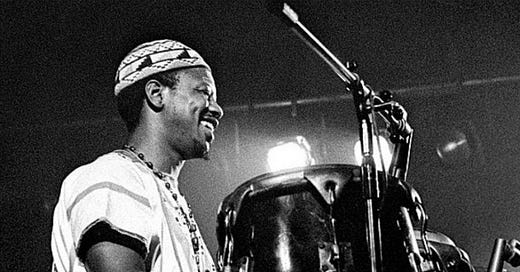Reebop Kwaku Baah (February 13, 1944 – January 12, 1983) – Stand Up and Fight Back (1978)
The great Ghanaian percussionist who played with Traffic and Can co-wrote and played on this powerful freedom anthem by Jimmy Cliff.
View most updated version of this post on Substack
Search our full archives
Reebop Kwaku Baah was a Ghanaian percussionist, best known as a member of the influential British group Traffic and German group Can during the 1970s. He appeared on several albums with both groups and released two solo LP’s of his own.
Anthony “Reebop” Kwaku Baah was born in Konongo, a mining town in Gold Coast (the British colony that became Ghana after its independence in 1957).
One of the first albums he played on was the 1969 LP African Cookbook by Randy Weston’s African Rhythms, which was recorded in Paris. Besides Baah on percussion it featured Weston on piano and Art Taylor on drums. They covered Dizzy Gillespie’s “Con Alma,” and coincidentally it was Diz who inspired Baah to adopt the nickname “Reebop.” Another standout was the funky closing cut “Afro Black.”
He joined Traffic in 1971 after meeting them while on tour in Sweden, and played on their classic albums The Low Spark of High Heeled Boys (1971) and Shoot Out at the Fantasy Factory (1973).
His debut solo album was released on Island Records in 1972. He wrote every one of its tracks, and co-produced the LP with Chris Blackwell.
It was an epic record, starting with its opening cut “If You Want To Go.” Other highlights included the funky jam “Silly Boy,” which was released in an edited version as a single; “Softly Weeping” featuring Steve Winwood on bass, guitar, and organ; the stellar jam “Problems” with Eddie Quansah on trumpet, dedicated to the memory of Dizzy Gillespie; and the phenomenal “Zagapam” featuring Quansah and Kenny Wheeler on trumpet and Traffic’s Chris Wood on flute.
His second solo album Anthony Reebop Kwaku Bah was recorded in November, 1971 but issued in 1973 on Phillips, a Swedish-only release. He again wrote every track, like the funky love song “Lovin’ You Baby” and the aptly titled “Funkum.” Original copies today sell for over $300 on average on Discogs.
During the mid-seventies, he appeared on the Rolling Stones’ 1973 LP Goats Head Soup and Billy Cobham’s album A Funky Thide of Sings (1975), including its super funky title track.
Baah and former Traffic bassist Rosko Gee joined the influential German Krautrock band Can in 1977, and played with them on three albums (Saw Delight (1977), Out of Reach (1978) and Can (1978)) until they broke up two years later. For their self-titled final LP, Baah co-wrote the epic opening cut “All Gates Open” and the funky jam “Safe.”
He played congas and percussion on Jimmy Cliff’s 1978 album Give Thankx, released on Warner Bros. Records and co-produced by Cliff and Bob Johnston. Baah also co-arranged the rhythm section and along with Cliff co-wrote the LP’s timeless freedom anthem “Stand Up and Fight Back.” It was released as a single, but did not chart.
During the early eighties, he played for a short time with the Phantom Band, featuring keyboardist Helmut Zerlett and former Can drummer Jaki Liebezeit.
In 1982, he joined forces with Zerlett and drummer Stefan Krachten to form The Unknown Cases. They recorded a classic dancefloor 12” with the proto tribal house-flavored “Masimba Bele” b/w the hypnotic dub jam “Oëkikawai,” released the following year in 1983. The three of them co-wrote both tracks, with Baah on lead vocals and percussion.
Sadly, Baah suffered a cerebral hemorrhage during a January, 1983 performance while on tour with Jimmy Cliff in Stockholm, Sweden and died, gone far too soon at age 38.
Happy Cosmic 80th Birthday to the great “Reebop” Kwaku Baah.
#reggae #rock #soul #funk #Traffic #Can #JimmyCliff #ReebopKwakuBaah








Didn't know any of this, thanks for schooling me. I'm a huge Can fan, but it took my ears growing up (along with me) to start to embrace those later albums—it's the groove of them, which I thought was Rosko Gee's doing. Now I know the bigger story. Those two songs are my favourite on that last Can album. Think it's time for me to do a little re-evaluation of that funky period of their timeline!
I stumbled on his 1st LP a few months back, and bought it simply on the strength of his huge smile on the cover. It's easily one of my favorite discoveries of the past year. I knew about his involvement with Traffic but I didn't know he was recording with Can. Thanks for highlighting and honoring Reebop!